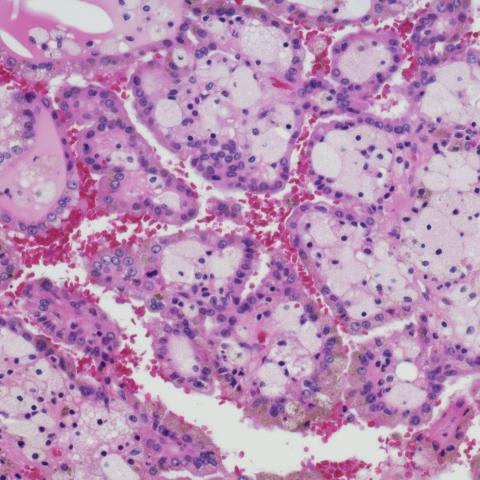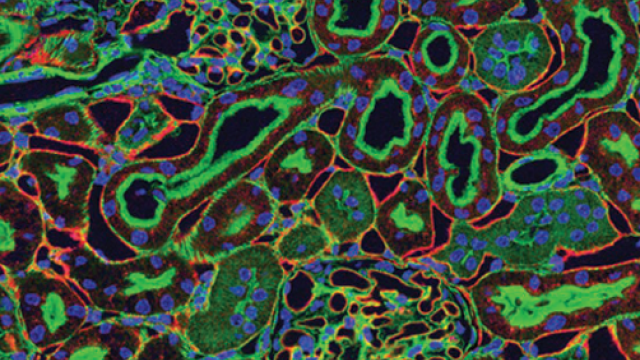
Micrograph of renal cell carcinoma. Image credit: iStock
CCR scientists have found that most patients who have an aggressive form of kidney cancer associated with an inherited condition called hereditary leiomyomatosis and renal cell cancer (HLRCC) benefit from a treatment that combines two targeted therapies, bevacizumab and erlotinib. In a phase 2 clinical trial, 72% of patients with HLRCC-associated cancers had confirmed responses to the treatment.
HLRCC-associated kidney tumors, which can arise in children and young adults, can begin to spread even when they are very small. Prior to this clinical study, led by Ramaprasad Srinivasan, M.D., Ph.D., Senior Investigator in the Urologic Oncology Branch, and reported June 19, 2025, in the New England Journal of Medicine, no drugs were known to be effective for treating HLRCC-associated kidney cancers.
Patients with HLRCC carry mutations in a gene called FH, which puts them at risk for developing cancers that were previously classified as papillary kidney cancers. Urologic Oncology Branch Chief W. Marston Linehan, M.D., has been studying this rare cancer for more than 30 years. After helping to define the genetics of the disease, Linehan and colleagues investigated why the loss of FH, a gene that cells use to generate energy, promotes kidney cancer development.
Studies from Linehan and Srinivasan’s labs revealed that HLRCC-associated kidney cancers are driven only in part by the cellular pathways that spur the growth of clear cell carcinoma, a more common form of kidney cancer. “We have learned that this is a different cancer from clear cell kidney cancer,” Srinivasan says. “So why would we treat it the same way?”
Both cancers are fueled by activation of a protein called VEGF, but drugs that block VEGF fail to stop HLRCC-associated kidney cancers on their own. The researchers figured out that cancer cells without FH need a lot of glucose to survive and that they might deprive them of that by blocking a protein called EGFR. Based on those findings, they hoped that by combining bevacizumab, a VEGF-blocking drug, with erlotinib, an EGFR-blocking drug, they could stop tumor growth in patients with HLRCC-associated cancers.
The trial in this rare disease, conducted over ten years at the NIH Clinical Center, provided evidence that the drug combination not only benefits patients with HLRCC-associated cancers, but also some patients with papillary kidney cancers not associated with HLRCC. Almost all of the 43 participants with HLRCC-associated cancers had their tumors shrink following the treatment, with 72% regressing enough to be considered a confirmed response. Forty patients with non-hereditary, sporadic papillary renal cell carcinomas—which are also difficult to treat—also participated in the trial, and 35% of those patients had confirmed responses to the treatment.
“The median survival now is almost four years with this combination treatment,” says Linehan. “We're thrilled about that. This has now become a standard treatment of this disorder worldwide.”
The research team is now investigating features of sporadic papillary kidney cancers that might predict a positive response to the combination therapy. They are also exploring additional ways to improve outcomes for patients with HLRCC. Srinivasan is leading a new trial testing the effects of bevacizumab and erlotinib in combination with an immunotherapy called atezolizumab.


